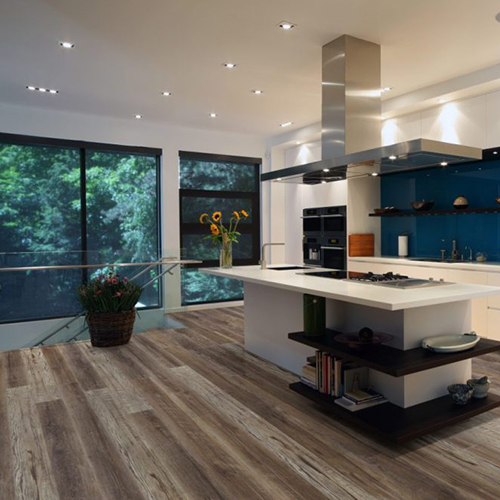Which Direction Should You Install Vinyl Plank Flooring?
Related Product: Cottage Tour Vinyl SPC Flooring 19.12 Sq Ft per Carton
How to Determine Which Direction to Install Vinyl Plank Flooring
There is no magic rule to whether you should install plank flooring horizontally or vertically, but it’s important to be aware of how the planks’ length and width can create different effects in a room. There are many installation theories to consider, and you will want to weigh the factors at work in your particular installation to decide which orientation is best.Start with Your Largest Wall
Many installers recommend that you run your planks so that they travel along the longest wall in your room. It’s theorized that this design helps to make your room look larger, but if you’re working with a thin room, you might find this strategy has the opposite effect.

Following this rule of thumb does have its advantages when it comes to the logistics of your installation, though. If you run the planks along the longer wall, you will be left with fewer planks to cut, which can save you time and labor.
In contrast, if you run the planks along the smaller wall, you will be left making more cuts, which can add on time.
Consider Your Natural Light Source
Natural light that comes in through a window will cause shadows to fall in a certain direction. You will want those shadows to compliment your flooring, not detract from it.

To accomplish this, find the wall with the windows that generate the most natural light. Then, run your planks toward that window.
This layout will result in the planks’ seams following the direction of the sun rays that come in through the windows, creating a beautiful look.
Look for Focal Points
You can use your flooring to enhance and draw attention to certain focal points in your room. These focal points might be a dramatic archway, a fireplace, or even a piece of furniture that you want to make an impact.
If you install your flooring so that the planks run toward that focal point, the lines of your flooring will also draw attention to that point, enhancing its effect.
Think About Transitions Into Adjoining Rooms
It’s also important to consider how the flooring will look in the transitions into adjoining areas, like rooms, stairs, or hallways. If you have similar flooring in these other spaces, you may want to install the flooring in the room so that it follows that same direction.

For example, if you are installing vinyl plank flooring on stairs, you will need to do so lengthwise. Following that direction as you move into the room can create a sense of continuity.
If your room transitions into a hallway, then planks will often run lengthwise through that hall. It can make sense to continue that pattern into the room.
By continuing that pattern, you can create an impression of the room and the hallway being one large space, making the area feel bigger.
If you’re looking to create a sense of continuity between rooms, then you will want to consider that effect when choosing your vinyl plank flooring. Vinyl flooring comes in many different finishes and designs, so you will want to choose a finish that resembles your existing flooring.
Alternatively, you might want to use that transition between the rooms as a sort of feature, itself, making a distinct differentiation between the spaces. You can accomplish that by changing the flow of the flooring to create that interesting contrast.
Test Before You Install
Once you think you’ve determined which direction to install vinyl plank flooring, it’s best to do a dry run. Lay out as many planks as possible without cutting them, running them alongside your walls, through the doors and into adjoining rooms, and to focal points in the room.
With the planks laid out, you can get a visual sense of how your completed room will look. Pay attention to how the floor flows and whether it enhances or detracts from key focal points.
Still not sure if the layout is right? Try turning the planks so they run in a perpendicular direction to see what sort of effect this alternate layout would create.
By laying out your tiles ahead of time, you can also experiment with how the plank finishes work together. At Greatmats, our vinyl plank flooring features many different finishes to avoid any sort of a repetitive, artificial pattern.
By pre-laying your flooring, you can hand pick the specific planks that look best when placed together, truly perfecting the end effect of your floor. Then, all that’s left to do is trim and click the panels together.
